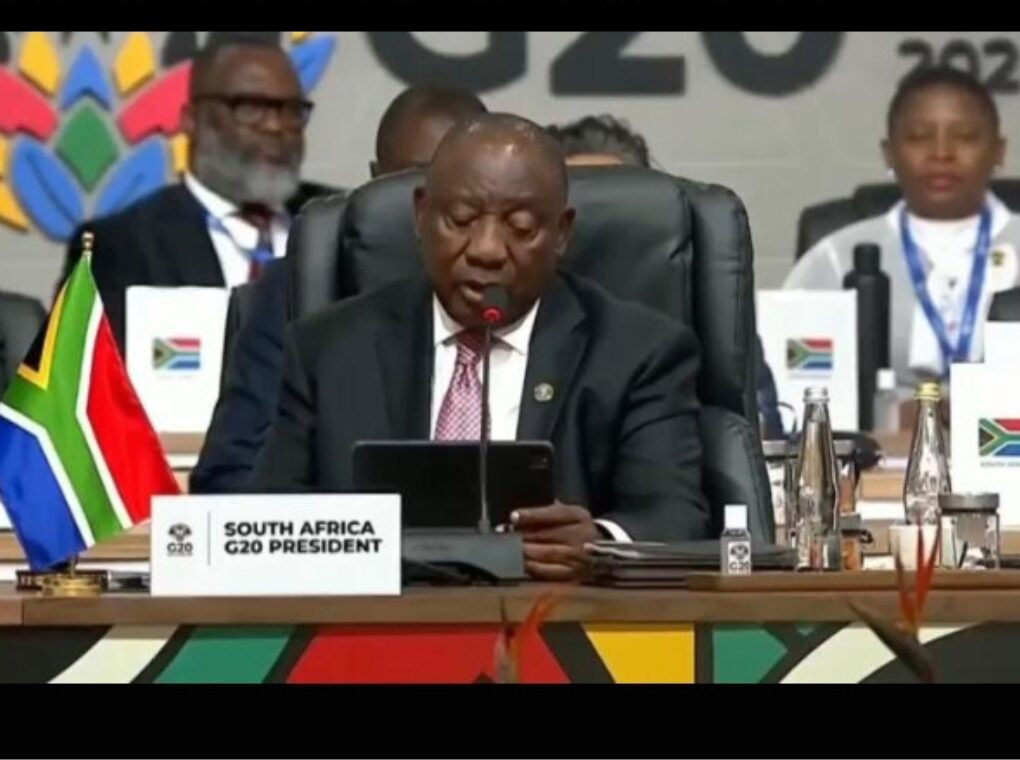The G20 summit in Johannesburg ended in an unprecedented diplomatic confrontation on Sunday after South Africa refused to conduct the ceremonial presidency handover to what it described as a “junior” US official. The clash marks a new low in rapidly deteriorating relations between Pretoria and Washington, which boycotted Africa’s first-ever G20 summit.
The United States is scheduled to assume the G20 presidency in 2026, with President Donald Trump set to host next year’s forum in Miami. But Pretoria said established protocol made the proposed handover impossible.
Boycott, Backlash, and a Breach of Protocol
Tensions erupted after the US deployed only a lower-level embassy official to Johannesburg following Trump’s boycott. South Africa responded by refusing to pass the G20 gavel to a diplomat it deemed beneath the required rank for a leaders’ summit.
Foreign Minister Ronald Lamola was unequivocal:
“It is the leaders’ summit. The right level is the head of state, a special envoy appointed by the president, or a minister.”
Pretoria argues that no G20 presidency has ever been transferred to a non-ministerial official and that accepting such a precedent would weaken the summit’s protocol structure. Government spokesperson Vincent Magwenya added that the President would “not hand over to a junior embassy official.”
The US, however, accused Ramaphosa of obstructing the process. White House Press Secretary Karoline Leavitt dismissed the South African president’s reasoning, saying he was “running his mouth a little bit against the United States and the president of the United States.”
The handover may now take place at a later date at South Africa’s foreign ministry headquarters.
Trump’s Boycott and the Wider Diplomatic Meltdown
The dispute comes after Trump refused to attend the two-day summit, claiming South Africa was enforcing “racist and anti-White policies” against its Afrikaner minority — a charge Pretoria has described as “baseless, inflammatory, and rooted in fringe narratives.”
The White House reinforced the boycott by objecting to South Africa’s climate and inequality-focused agenda, which the US argued was too ideologically driven. Trump had already dismissed climate transition goals, debt reform proposals, and renewable energy targets championed by African and developing nations.
At one point, Ramaphosa claimed Washington had attempted to join the summit belatedly, a claim the White House sharply denied.
Declaration Pushed Through Despite US Objections
In another break from G20 tradition, South Africa released the Leaders’ Declaration on the opening day of the summit rather than at the closing ceremony—a move widely interpreted as an attempt to prevent last-minute US intervention.
The declaration included:
Strong warnings on climate change
Calls for ambitious global renewable energy targets
Demands for easing the debt burdens faced by developing nations
Ramaphosa celebrated its adoption as “a renewed commitment to multilateral cooperation,” despite the absence of the world’s largest economy.
Argentina also withheld support, with President Javier Milei — Trump’s closest ally — skipping the summit entirely.
Global Divisions Over Ukraine, Climate, and Development
The summit convened amid escalating geopolitical fractures. The 122-point communiqué offered only a single broad reference to global conflicts, deeply disappointing Western nations hoping for stronger condemnation of Russia’s war in Ukraine.
French President Emmanuel Macron acknowledged the significance of Africa hosting the G20 but admitted the grouping was increasingly divided:
“This marks an important milestone, but the bloc is struggling to have a common standard on geopolitical crises.”
Meanwhile, climate talks remain deadlocked ahead of COP30 in Brazil, raising doubts about global commitments on emissions and financing.
Symbolic Victory for Global South Priorities
Despite the rancor, Africa and the wider Global South claimed a diplomatic win. The summit placed inequality, debt distress and climate adaptation at the center of its agenda for the first time in G20 history.
Max Lawson of Oxfam welcomed the shift:
“This is the first-ever meeting of world leaders where the inequality emergency was put at the centre of the agenda.”
Namibian President Netumbo Nandi-Ndaitwah added that development must finally be addressed “from the African perspective.”
What Happens Next?
The failure of the ceremonial handover raises procedural questions ahead of the 2026 G20 presidency. While the US will still assume leadership as scheduled, experts say the political strain could undermine cooperation throughout Trump’s term — especially on climate, debt relief and geopolitical issues.
For now, the diplomatic rift between Washington and Pretoria remains wide open, with both sides accusing the other of breaching the spirit and traditions of the G20.
